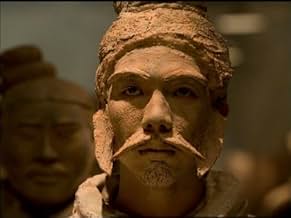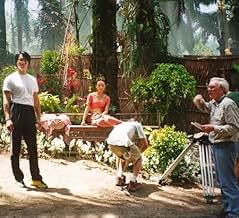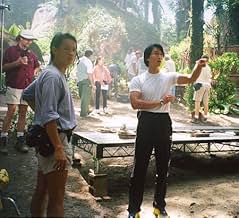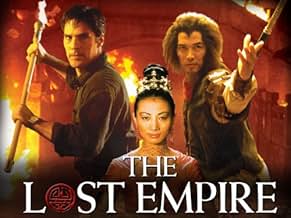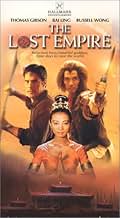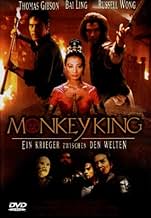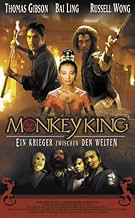Guerreiros do Império Perdido
Título original: The Lost Empire
AVALIAÇÃO DA IMDb
5,5/10
1,8 mil
SUA AVALIAÇÃO
Adicionar um enredo no seu idiomaAmerican journalist seeks lost Chinese manuscript, journeying with magical humanoid ape, pig-man, and ex-cannibal friend. Adventure based on renowned tale.American journalist seeks lost Chinese manuscript, journeying with magical humanoid ape, pig-man, and ex-cannibal friend. Adventure based on renowned tale.American journalist seeks lost Chinese manuscript, journeying with magical humanoid ape, pig-man, and ex-cannibal friend. Adventure based on renowned tale.
- Indicado para 1 Primetime Emmy
- 4 indicações no total
Explorar episódios
Avaliações em destaque
Yes, the weaknesses of this movie are numerous. The acting is, for the most part, horribly wooden, particularly with the lesser supporting characters. The real-world history is way off (among other flaws already pointed out in other reviews, "Journey to the West" is, according to what I've read at least, closer to 400 years old than 500, and the official objection to the manuscript was its nontraditional form rather than its content). Some of the characters, particularly four of the Five Traditional Masters, are way underdeveloped. Portraying Confucius as a self-serving sycophant is just *wrong.*
If you're already familiar with the original story of "Journey to the West" and can't bear to see it butchered -- which is exactly what happens here -- then follow the one-star ratings given here and avoid this movie like the plague.
For anyone else, this is a fun piece of work. It was hardly Emmy-worthy in any category (with the possible exception of Bai Ling's impassioned performance as the Goddess of Mercy) and has numerous plot holes not worthy of David Huang, but the story travels on well with only a couple of relatively minor diversions (well, I guess NBC wanted to make sure they had a good two-part miniseries), one can really care about those characters that do receive proper development, and can wonder and worry about the story's outcome.
If you're already familiar with the original story of "Journey to the West" and can't bear to see it butchered -- which is exactly what happens here -- then follow the one-star ratings given here and avoid this movie like the plague.
For anyone else, this is a fun piece of work. It was hardly Emmy-worthy in any category (with the possible exception of Bai Ling's impassioned performance as the Goddess of Mercy) and has numerous plot holes not worthy of David Huang, but the story travels on well with only a couple of relatively minor diversions (well, I guess NBC wanted to make sure they had a good two-part miniseries), one can really care about those characters that do receive proper development, and can wonder and worry about the story's outcome.
Lost Empire, a VERY strange title for a retelling of the old Chinese classic adventure "Journey to the West", is a mixed bag of a film. David Hwang's screenplay is in many respects a sequel to the original story, as opposed to being a modern rendition of the original story. I regard this as a mistake as I believe Mr. Hwang lost more by giving up on the original characters than he gained by having a modern setting.
Good points: The lovely Ling Bai did a good job as the Bodhisattva of Compassion (Kwan Yin). Some scenes with Monkey and the "Scholar from Above" went well (mainly the scenes when Monkey rescues his subjects on Flower Fruit Island). Some interplay between "Sandy" and the "Scholar from Above" was funny. Some of the art design for the palace of the Jade Emperor was good (but NOT the throne room, yuk!).
Bad points: Too many explosions. A really ugly and totally wrong portrait of Confucius (I could go on for some time but I'll stick with this key point: Confucius was a materialist. He had no interest in religion and spirits. He was only interested in how a good state was run. The depiction of Confucius in this movie is totally at odds with EVERYTHING that Confucius stood for.) The last half-hour of the movie was anti-climactic, over-wrought, and uninteresting.
Deeper problems: Journey to the West is, at its core, at Buddhist story about the quest to attain enlightenment (along with the fun stuff about beating demons). This story (Lost Empire) takes place AFTER Monkey and Sandy have achieved their ultimate state. They are both "supposed" to be enlightened beings. The problem with this is that a) they don't act like enlightened beings, and b) there isn't much drama possible when you are enlightened. You can really tell the weakness in the writing when Kwan Yin has to tell Monkey's old teacher that "Monkey HAS been blessed by the Buddha". If you need a 3rd party (a goddess no less) to convince other people that you have become enlightened and have been blessed by the Buddha, well, its clear to me that the story is saying one thing, but doing another.
In fact, none of the characters behaves "in character". At least not like the characters that you enjoyed when reading "Journey to the West".
Deepest problem: the story (Lost Empire) is trying to both be and not be "Journey to the West" at the same time. Its trying to both be true to original ideas and be "modern" and up-to-date at the same time. Its trying to be a sequel that retells the original story. It is, in short, a total mess at a very deep level. -- Colin Glassey
Good points: The lovely Ling Bai did a good job as the Bodhisattva of Compassion (Kwan Yin). Some scenes with Monkey and the "Scholar from Above" went well (mainly the scenes when Monkey rescues his subjects on Flower Fruit Island). Some interplay between "Sandy" and the "Scholar from Above" was funny. Some of the art design for the palace of the Jade Emperor was good (but NOT the throne room, yuk!).
Bad points: Too many explosions. A really ugly and totally wrong portrait of Confucius (I could go on for some time but I'll stick with this key point: Confucius was a materialist. He had no interest in religion and spirits. He was only interested in how a good state was run. The depiction of Confucius in this movie is totally at odds with EVERYTHING that Confucius stood for.) The last half-hour of the movie was anti-climactic, over-wrought, and uninteresting.
Deeper problems: Journey to the West is, at its core, at Buddhist story about the quest to attain enlightenment (along with the fun stuff about beating demons). This story (Lost Empire) takes place AFTER Monkey and Sandy have achieved their ultimate state. They are both "supposed" to be enlightened beings. The problem with this is that a) they don't act like enlightened beings, and b) there isn't much drama possible when you are enlightened. You can really tell the weakness in the writing when Kwan Yin has to tell Monkey's old teacher that "Monkey HAS been blessed by the Buddha". If you need a 3rd party (a goddess no less) to convince other people that you have become enlightened and have been blessed by the Buddha, well, its clear to me that the story is saying one thing, but doing another.
In fact, none of the characters behaves "in character". At least not like the characters that you enjoyed when reading "Journey to the West".
Deepest problem: the story (Lost Empire) is trying to both be and not be "Journey to the West" at the same time. Its trying to both be true to original ideas and be "modern" and up-to-date at the same time. Its trying to be a sequel that retells the original story. It is, in short, a total mess at a very deep level. -- Colin Glassey
Surprisingly and shockingly awful. There are a lot of significant events, but no story. Constant stickfights that all look the same, aren't very exciting, and all the good guys win far too easily so no tension is created, do not make a movie action packed. Constant scenes of giant whirlpools or people flying do not make a movie magical when the scenes are poorly done and completely unmotivated by character. Watching two people kiss and express their love for one another does not make a movie romantic unless the two characters have some chemistry and interaction. The problem isn't that this movie is cheesy and formulaic. The problem is that the cheesy formula is unbelievably poorly executed. The characters are never developed, the special effects (especially the tiger) are often second rate, the story is not only derivative of every fantasy movie ever but derivative of itself (two separate villages that have had their children kidnapped by bad people), at least don't repeat your own ideas in the same movie. Dialogue is awful and cardboard, and the acting is pretty much lousy. This is everything the typical, paint-by-numbers approach to movie making yields. This movie is so bad it's insulting to it's audience. Horrible. Save yourselves and don't go near this worthless mess of a mini-series.
The Lost Empire is a excellent updating and play off a an ancient Chinese novel entitled "Journey to the West".
For viewers who have some knowledge of Chinese myths and stories this movie is a real treat. It brings back all the wonderful characters of one of the most beloved novels of childhood.
On the other hand if you don't have a clue who the Monkey King was, let alone the celestial Kingdom and the Jade Emperor, than you might not get the underlying story elements, but the movie should still be a great deal of fun simply as a great adventure story with wonderful special effects and some very amusing characters.
This movie can be enjoyed by young and old. Think of it as an Asian version of Wizard of Oz, Ben Hur and Indiana Jones all rolled into one.
For viewers who have some knowledge of Chinese myths and stories this movie is a real treat. It brings back all the wonderful characters of one of the most beloved novels of childhood.
On the other hand if you don't have a clue who the Monkey King was, let alone the celestial Kingdom and the Jade Emperor, than you might not get the underlying story elements, but the movie should still be a great deal of fun simply as a great adventure story with wonderful special effects and some very amusing characters.
This movie can be enjoyed by young and old. Think of it as an Asian version of Wizard of Oz, Ben Hur and Indiana Jones all rolled into one.
The Lost Empire, or The Monkey King, as it was called when I saw it on the Hallmark Network, is a silly film, but a very enjoyable one. It attempts to put a new spin on the Chinese classic, Journey to the West, which tells the story of how a monk went on an epic journey to recover some sacred scriptures, aided by the mischievous Monkey King, the gluttonous Pigsy and the sombre Sandy.
In this modern version the companions are the same, but the monk is replaced by a modern American sinologist, and the "scripture" is the original manuscript of Journey to the West itself, which is about to be destroyed by the "five traditional masters", who represent the forces of conservatism. Confused? It gets worse; if the book is destroyed, all the human progress that has taken place since the book was written will be reversed and the world will revert to feudalism. To cap it all, the Jade Emperor, Confucius and Kuan Yin, the goddess of compassion, are all weighing in.
With a scenario like this, the film cannot help but being absurd in places, but the absurdity, intentional or otherwise, is part of the fun, as it was in the original Journey to the West, which is a comedy as well as an analogy of the spiritual journey. Viewers who have read Journey to the West will enjoy the references to it; others can sit back and enjoy the visual richness, which as well as some spectacular scenes and SFX, includes Bai Ling as Kuan Yin, looking far more sexy than a goddess of compassion ought to (but then that's one of the twists in this tale as well).
In this modern version the companions are the same, but the monk is replaced by a modern American sinologist, and the "scripture" is the original manuscript of Journey to the West itself, which is about to be destroyed by the "five traditional masters", who represent the forces of conservatism. Confused? It gets worse; if the book is destroyed, all the human progress that has taken place since the book was written will be reversed and the world will revert to feudalism. To cap it all, the Jade Emperor, Confucius and Kuan Yin, the goddess of compassion, are all weighing in.
With a scenario like this, the film cannot help but being absurd in places, but the absurdity, intentional or otherwise, is part of the fun, as it was in the original Journey to the West, which is a comedy as well as an analogy of the spiritual journey. Viewers who have read Journey to the West will enjoy the references to it; others can sit back and enjoy the visual richness, which as well as some spectacular scenes and SFX, includes Bai Ling as Kuan Yin, looking far more sexy than a goddess of compassion ought to (but then that's one of the twists in this tale as well).
Você sabia?
- CuriosidadesLoosely based on the story from classical Chinese Literature "Journey to the West".
- Citações
Nicholas Orton: So I might never get rich, buy my own jet, or even maintain a stock portfolio. But when I look in her eyes, I know that none of these things really matter.
- ConexõesReferences A Mosca da Cabeça Branca (1958)
Principais escolhas
Faça login para avaliar e ver a lista de recomendações personalizadas
- How many seasons does The Monkey King have?Fornecido pela Alexa
Detalhes
- Data de lançamento
- Países de origem
- Idiomas
- Também conhecido como
- The Monkey King
- Empresas de produção
- Consulte mais créditos da empresa na IMDbPro
Contribua para esta página
Sugerir uma alteração ou adicionar conteúdo ausente




